
Blog: 100 hours in India: Palliative Care, Nephrology, and the best Parathas
![]() Hannah Ikong
Hannah Ikong
![]() 27th March 2023
27th March 2023
What can you accomplish during a little over four days in India? For Dr Peace Bagasha, there was quite a lot to do.
Peace is a renal specialist working at Mulago Hospital who is pursuing her PhD via research at Makerere University in Kampala, Uganda, In the short time between 9th and 13th February, Peace retold her many trip activities and palliative care sessions to the Cairdeas communications team. It was a lovely, jam-packed 100 hours, she reports, yet not nearly enough time to read the book she brought!
Peace’s short journey began in Bangalore where the Indian Association of Palliative Care (IAPC) held its 30th Annual Conference, #IAPCON2023. This conference was not your typical palliative care get together. First, for Peace, her time there was more like an annual palliative care family reunion.
Joining other palliative care specialists like Dr Mhoira Leng, Prof Julia Downing, and Dr Chitra Venkateswaran, they attended a dinner on her first night there, with other presenters and organisers of IAPCON 2023. As many at Cairdeas may know, Mhoira has been a part of this IAPC conference since its beginning, and so it was a pleasure to catch up with old friends.
#IAPCON2023 was also unique in the theme and set up of subspeciality tracks. This year’s theme was “Metamorphosis: The Emergence of Subspeciality Palliative Medicine” and Peace explained how the conference sessions were designed to bring out each subspeciality and demonstrate the role palliative care in it.
For Peace herself, she presented for 30 minutes on nephrology and palliative care, or “renal supportive care.” Her presentation title was, “What is the evidence HRQoL, survival benefits of patients with ESKD receiving Haemodialysis, Vs. Conservative Kidney Management.”
Peace shared about the other tracks she attended, such as a session in cardiology titled “Role of nurses in managing heart failure.” The speaker, Sister Hanife, advocated nurse empowerment, which implicates nurse inclusion in patient decision making. Hanife argued that nurses are involved in so much hands-on care, and we need to appreciate their experience and support in caring for patients, especially at end of life.
While Peace spent most of her time at the conference while in Bangalore, she had several highlights of the area itself. Bangalore was a “garden city” and the beautiful greenspaces were enhanced by the good, cool weather while she was there.
She then shared about Karunashraya Hospice, which hosted the dinner on their first night there. Not only is the hospice facility beautiful with gardens and ponds, but they are the first hospice in India to provide free home-care for terminally ill cancer patients. Their website explains more, saying, “Since the launch of home care services in 1994, we have cared for more than 3000 patients, and have around 50+ patients under our care at any point of time.”
I had to ask Peace about the delicious types of food she ate while on her trip in India. Her answer surprised me: Paratha! Like the flat chapatis you can find in Uganda, another partner country of Cairdeas, Parathas are unleavened Indian flatbreads made with whole wheat flour. I asked Peace if she only ate this tasty bread, and she laughed. “No,” she said, explaining that you can eat with curries like chicken or lamb.
You may think the 100-hour journey stops here but there is was one more trip: after her presentation at #IAPCON2023, Peace travelled to Mumbai and some managed to participate in a workshop, tour some of Mumbai, and visit a hospital paediatric palliative care unit.
We spoke mostly on her workshop that she engaged in about renal supportive care. The workshop had several rich discussions, she said, since many nephrology groups are starting to integrate palliative care into their programmes.
The workshop was a good learning environment too, causing Peace to conclude, that for her place of work in Uganda, “I think we really need to set up a really structured renal supportive care programme.”
How would you spend a short 4 days in India? In a little under 100 hours, in short, for Peace, she was presenting at a conference and participating in a workshop, touring the area,and visiting a hospice and a hospital, all spanning two beautiful and diverse cities. Reading that sentence can leave you a little breathless!
Even so, we wish to extend a very large thank you to Dr Peace Bagasha for her work and role in renal supportive care and for #BuildingaWorldthatCares.
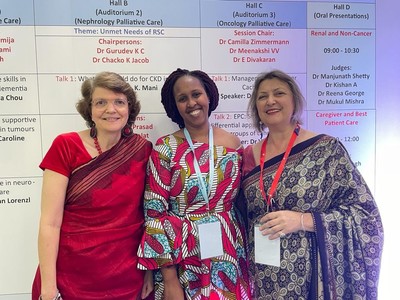
A lovely picture of Prof Julia Downing with Drs Peace Bagasha and Mhoira Leng.
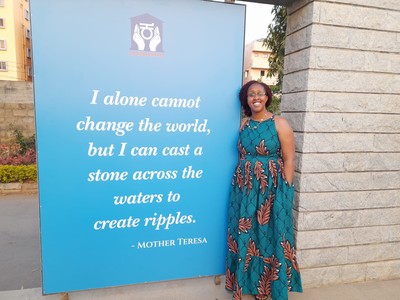
Dr Peace Bagasha at Karunashraya Hospice.
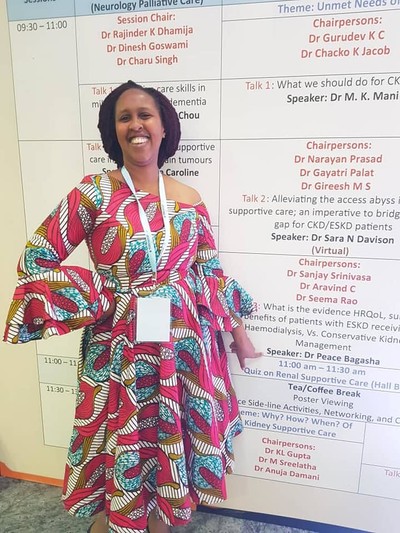
Dr Peace Bagasha points at her session at the IAPCON conference: “What is the evidence HRQoL, survival benefits of patients with ESKD receiving Haemodialysis, Vs. Conservative Kidney Management.”
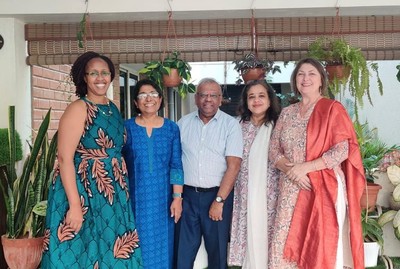
A group photo while in Bangalore: Drs Peace Bagasha, Ann Thyle and Sid, Prof Chitra Venkateswaran and Dr Mhoira Leng.
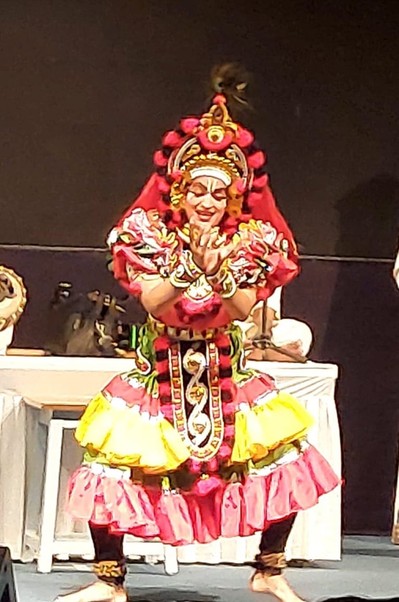
A traditional dance performance at the conference! What would you do if you had 100 hours in India?
